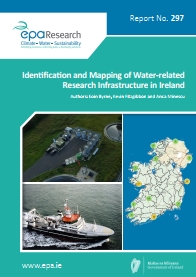Authors: Eoin Byrne, Kevin Fitzgibbon and Anca Minescu
Summary: This project developed a new online national WRI database by collaborating with the water research community in Ireland, using an interactive consultation and design process. It is a central database of information on all WRI in Ireland, including the types of WRI available for various research areas and applications, from the freshwater sector to the marine, climate and agriculture sectors.

In order to conduct excellent water research, researchers require access to appropriate water research infrastructure (WRI); as well as suitable support services (e.g. assisting with use of the WRI), and openness on the part of owners & managers of existing WRI to assisting public and private sector innovation (e.g. through trialling new technologies). Much of the water-related research and monitoring facilities in Ireland are operated on a stand-alone model, neither connected to other pieces of infrastructure, nor easily accessible to other research activities for reasons including lack of knowledge of them, unclear access procedures or financial constraints in relation to staff or maintenance costs. This is a major challenge that needs to be addressed to enable more effective water research.
The origins of this project lie in perceived gaps in the overall planning, management and communication of information about the wide range of WRIs in Ireland. At the outset of the project, there was no national database of Ireland’s WRI available to the public or to researchers.
At the European level, the European Strategy Forum on Research Infrastructures (ESFRI) roadmap and the RI support schemes under the European Union (EU) Framework Programmes co-ordinate investment in large RIs across Europe. At the national level, Ireland has science, technology and innovation strategies in which RI plays a key role. Organisations such as Science Foundation Ireland (SFI) and the Higher Education Authority (HEA) have funded RI programmes and provided guidelines on accessibility. Although Ireland’s National Research Infrastructure Roadmap addresses RI needs in overall terms, the water sector is not identified in that plan as a specific area, and WRI per se is not specifically identified. Water research is a broad research area and consists of several sub-areas, ranging from freshwater and catchments to the marine environment and the biodiversity of these ecosystems. This has resulted in numerous and diverse organisations in Ireland being involved in setting the strategy and providing funding for water research and associated WRI, coordinated by the Water Research Coordination Group (WRCG). Through this study, key factors were identified that are important in the development, management and planning of WRI in Ireland, including building on strengths, taking account of various RI scales, accessibility issues, sustainability, funding and WRI gaps and opportunities. The outcomes and data from this project will help define future RI priorities and inform national policy on water-related infrastructure development.
This project was tasked with identifying and mapping the location of relevant WRI in Ireland and developing a database of this key information on WRI, making it available online to the public and the water research community in an easy-to-use format. At the conclusion of the project, almost 80 WRIs had been uploaded to the database by over 20 organisations in Ireland across 120 locations. The results were collated in a new database and made available online, through the EPA’s DROPLET (Database of Research Outputs: Projects Literature and Environmental Technologies) website (http://erc.epa.ie/ droplet/). The WRI database raises the profile of individual WRIs and helps connect the water research community by giving access to information on WRIs and their facilities, services and related areas of research. This will help researchers pursue new opportunities, and partner and collaborate with colleagues, particularly in the case of interdisciplinary teams. The data will also help ensure effective planning for future WRI, by identifying gaps in existing infrastructure and opportunities for new infrastructure. Looking forward, the project developed a WRI roadmap, including recommendations on how best to advance WRI in Ireland, which included interviews with RI managers.
https://www.epa.ie/media/archive/research/research-thumbnails/Research_297_thumbnail.jpg